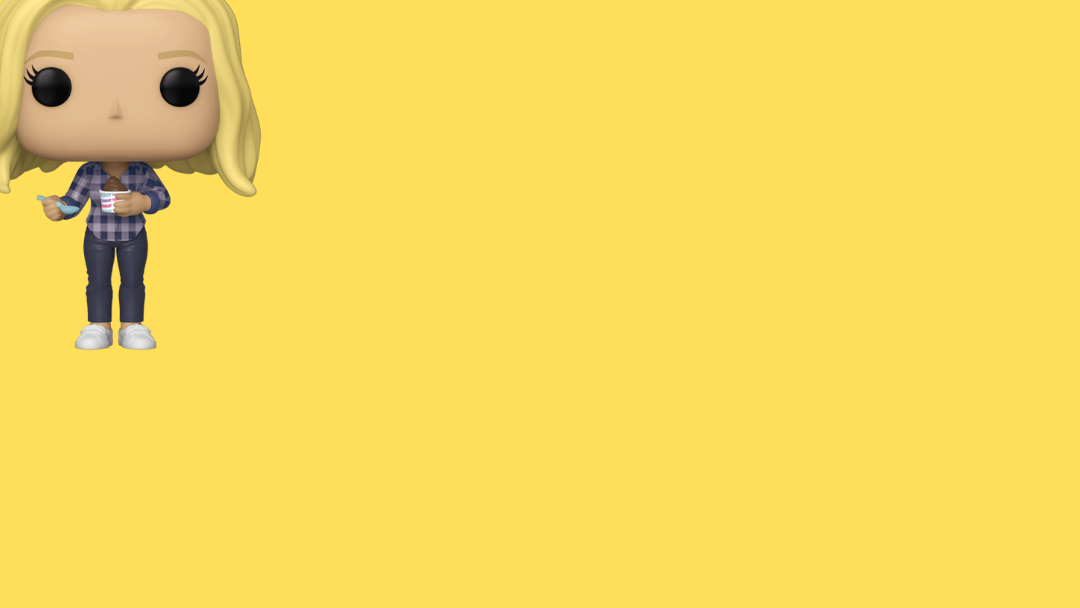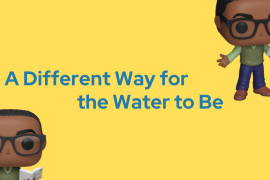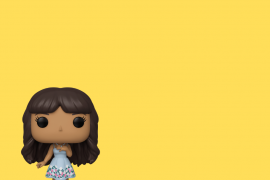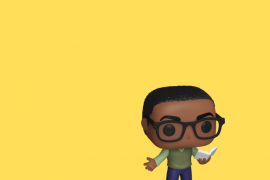I WAS IN ELEMENTARY SCHOOL WHEN I REALIZED MY FAMILY’S WAY OF LIVING WAS UNUSUAL.
My father, an officer in the U.S. Air Force, routinely took assignments that prompted moves across the country, and even one that took us briefly to Germany in 2000. I moved ten times before my sixteenth birthday, the final move being to my mother’s hometown following my parents’ divorce.
To this day, when people ask me where I’m from, I don’t know how to answer.
**
Thanksgiving weekend, 2019. The first holiday in years that my spouse and I were able to spend together, alone, off work and comfortable. An opportunity to binge a new show.
I scrolled through our Netflix list and landed on a close-up photo of Kristen Bell’s face, half-covered with large sunglasses.
“Do you want to try The Good Place?” I asked. Paul shrugged. “We can just try an episode and see what we think.”
Six hours later, we were halfway through the second season, unable to satiate a ravenous appetite we didn’t know existed. It was like a grief awakened and, once disturbed, could not be quieted.
We found every available moment to continue the binge. Once we exhausted the seasons available to us on Netflix—once we reached the end of season three, and my guts were wrenched from my body as Chidi made his heartbreaking decision—we turned to Sling to watch what was available of the final season.
Then, we had to wait. Wait for the final four episodes of what was now, without a doubt, my favorite show of all time.
**
At night, my mother read to us from a large yellow Christian devotional. When I was baptized at age nine, my gift was a Bible all my own.
Goodness was valued as gold, and similarly transactional—extended in exchange for redemption.
I became obsessed with being “a good person,” and yet found myself rebelling against the definition I was given—occasionally lying to protect a friend (or myself), thinking unkindly of my class’s bullies and even daring to express my thoughts aloud. Guilt began to stack like bricks to wall the possibility of my goodness apart from my humanity.
Could I ever be “a good person”? If not, what would be my fate?
**
For weeks, I spoke only in quotes from The Good Place. I appropriated the charming replacement curse words, just as I would have in the days when I believed cursing to be a sin.
I requested Scanlon books from my library and tried to make sense of the work that inspired the show that knew me so well.
When choosing a gif response—The Good Place. When I needed background noise—The Good Place. In two months, I rewatched the show three whole times.
In my life, I can’t think of a similarly transcendent experience.
Then came January.
**
I started writing when I was six, after the fourth move landed us in Virginia.
Maybe it was the years of transience, maybe it was just an obvious outcome of a newly learned skill, but once I started writing, I never really stopped.
In second grade, I wrote story after story about adventures that I took with my treasured doll, Baby Shnouks (pronounced “shnooks” but spelled incorrectly, because I was a rebel even in this). From there, I moved on to stories about a girl living in Ireland (inspired by the film The Secret of Roan Inish), stories about girls with magical powers (inspired by the Avalon: Web of Magic series by Rachel Roberts), then wrote my first “real” novel at age thirteen (inspired by The Two Princesses of Bamarre by Gail Carson Levine).
Bad poetry, bad books, bad lyrics I sang with wistful enthusiasm at open mic nights in university—words spilled from me in hapless overflow. Writing was how I came to know the world, and how it came to know me. More than once, the page and a pen saved me from myself, from the wrong someone else, from the pull of pills and too much booze.
When the symptoms first started, writing brought me back to life, and again every day they’ve plagued me since.
**
We had four episodes left. Four weeks (what fraction of a Bearimy?).
Watching The Good Place in real-time was both a new and familiar experience. Years of streaming-service-only living had spoiled my recent adulthood, but I was old enough to remember the days of serialized TV—the anticipation—the anxiety.
In the end, I cried through the entire finale. Not glistening eyes, croaky voice crying—twin waterfalls, choking sobs, cheek muscles twitching from the uncontrollable frown crying.
I was starving, desperate, clambering for the finale, and yet it came faster than I wanted it. When it was over, it was over, and all that was left was me, on my bed, the tears still coming, even in the darkness of a blank TV screen.
I conceded to my body’s instinct. I owed it that much, at least.
**
The pain in my legs emerged when I was thirteen.
It was distinct and brutal—muscles burning like I’d run for miles and miles when I hadn’t left the couch in days.
At the time, my family believed this was growing pains—I was the right age, I just gotten my first period, so it seemed plausible.
But the pain continued for years. And years. Until now.
When I was 28, I was sent to the ER for symptoms of appendicitis. In the notes for the CT scan conducted to diagnose my condition (which wasn’t appendicitis or the bladder infection they claimed was the cause of my pain), I noticed something disturbing: chronic bilateral pars fractures.
This one note, buried in a technician’s review of my insides, led me on a three-year journey of diagnosis and treatment—an acknowledgment of decades of chronic pain and disability—and a sense of myself as a whole person, at last.
**
At first, I couldn’t accept that it was the end. It felt final and magical and complete, and yet I wanted more. What was Tahani’s life like as an architect? How was Janet doing without the team in the Good Place? Was Michael faring well as a human?
I recognized that want as a beautiful consequence of a story well told, but it felt like fire, like a fever that wouldn’t break.
**
In the series finale, after Chidi confesses he is ready to cross over, that he has been ready, Eleanor says, “I owe it to you to let you go.”
Someday, sooner than I want to, I will have to say this to my mother. The mother who taught me how to be good from the thin pages of the Good Book. The mother with whom I wandered Jacksonville and so many places around the world.
**
In 2014, my mother and I drove to Jacksonville, Florida. The Good Place did not exist yet.
We listened to episodes of Welcome to Nightvale that I had burned onto CDs (because her car didn’t have Bluetooth) and talked about any and everything. It was our second drive from Texas to Florida in four years, both propelled by academic dreams. That spring, she was due to present The Great Gatsby to high school students as part of a greater symposium, invited by a friend of our mentor.
We stopped in Alabama to visit her sister and sleep. We watched Murder, She Wrote before bed and she laughed when I meowed the theme song.
The drive along Florida highways has a dreamy quality in my memory—forests along either side of asphalt, anti-abortion billboards interspersed with ads for truck stops and 24-hour diners, all impossibly far away, like they didn’t exist at all.
We didn’t know about Blake Bortles, who was drafted to the Jacksonville Jaguars later that year, and had mixed opinions about electronic dance music. Jason would have been so disappointed in us.
My mother’s presentation went well. One of the teachers at the host school invited us to her condo on the beach, and we wandered ankle-deep into the cold March waves together, flip-flops in one hand, camera in the other.
On our last day, we stopped at a street market under a highway overpass. Artists and farmers hocked their wares in the shadow of concrete and steel, the whirr of engines howling overhead.
I met a man named Jay who painted fantasyscapes with dark acrylics. Shoulder-length gray hair flopped in loose curls around his head. He refused to name his paintings, but when I asked him why, he couldn’t answer, just picked at the dried paint under his fingernails.
“Do you want one?” my mother asked. My eyes lingered on a medium canvas featuring a black castle against a night sky.
In April 2019, my mother was diagnosed with stage three ovarian cancer, and I hung Jay’s painting over my desk, and I started painting because my hands couldn’t find the words to talk about the way her body was destroying our lives.
And then I found The Good Place.
**
“At thirty, a man should know himself like the palm of his hand, know the exact number of his defects and qualities, know how far he can go, foretell his failures – be what he is. And, above all, accept these things.”
This quote is attributed to Albert Camus, but no one on the internet can tell me when or where he said it.
A friend of Sartre, Camus was a moralist, and deeply political. A Leftist. A womanizer.
I wonder where he went when he was thrown from Michel Gallimard’s Facel Vega HK500, just a few days into 1960. A new decade, void.
**
In season four, episode nine, Chidi says, “It turns out life isn’t a puzzle that can be solved one time and it’s done. You wake up every day, and you solve it again.”
It’s one of those things you come to know with age, but when you hear it out loud—it sinks in, and with it, a kind of peace. A release from the pressure to have it all figured out. Permission to keep searching, keep trying. A promise that trying is enough.
I needed that reassurance in November 2019. I need it now, in April 2020. I’ll need it, I’m sure, for the rest of my life.
That’s the true power of The Good Place—the way it gives again and again, and only asks for one thing.
Shrampies. Plenty of shrampies.
NEW book release
I’ll Tell You a Love Story by Couri Johnson. Order the book of which Tim Jeffries said, “Surprising in their originality, filled with broken wisdom, and with a refreshing use of language and imagery, these are stories to savour and mull over one at a time but which add up to a satisfying whole.”
GET THE BOOKLike what you’re reading?
Get new stories or poetry sent to your inbox. Drop your email below to start >>>
OR grab a print issue
Stories, poems and essays in a beautifully designed magazine you can hold in your hands.
GO TO ISSUES




